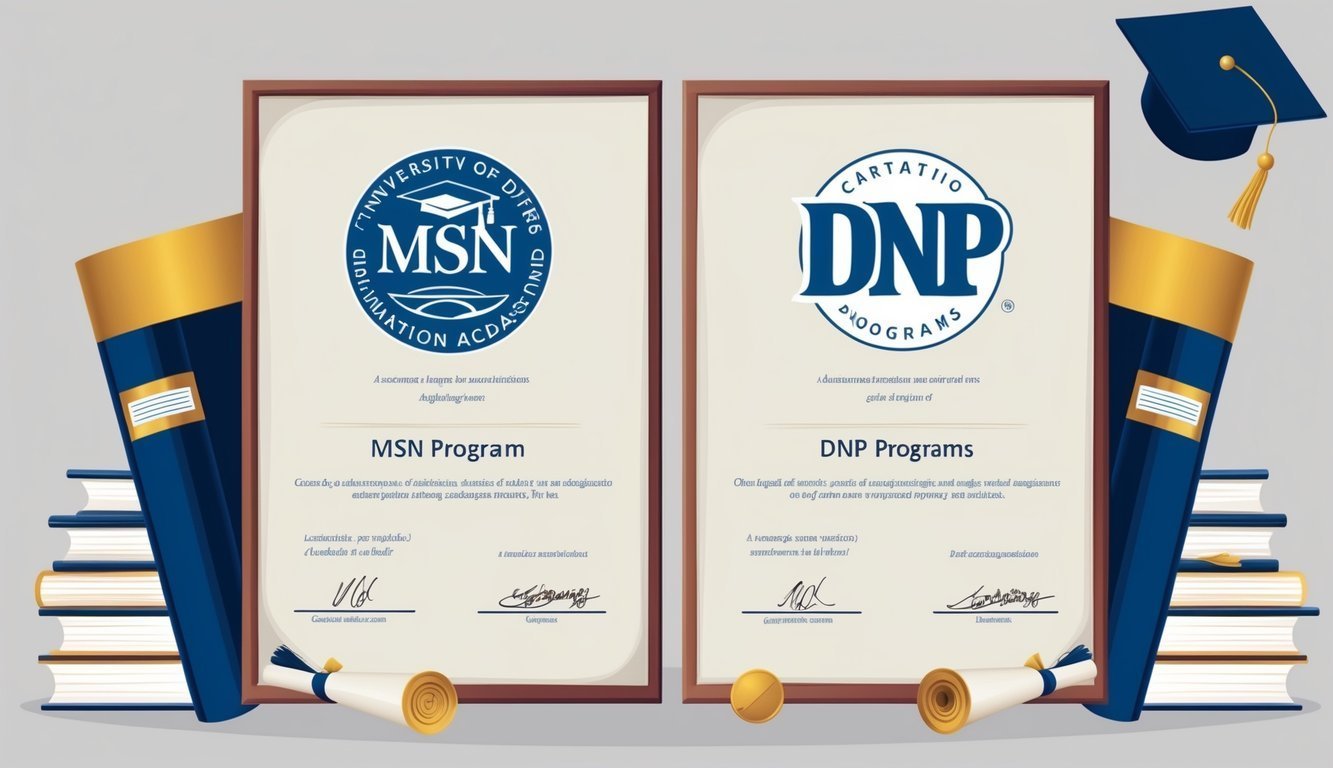Pursuing a career in nursing can open many doors, especially when you consider advanced degrees. MSN DNP dual programs allow you to earn both your Master of Science in Nursing and Doctor of Nursing Practice in a streamlined process. With these programs, you delve deeper into clinical practices while enhancing your career opportunities.
These dual programs are designed for those who want to gain expertise in various specialties while balancing their education with work commitments.
By choosing this pathway, you position yourself for leadership roles in nursing, which are increasingly in demand.
Moreover, you gain access to valuable resources and support that can guide you throughout your studies.
In addition, you will explore a comprehensive curriculum that covers essential skills and knowledge areas needed in advanced nursing roles.
This educational approach not only fosters your professional growth but also prepares you to meet the evolving healthcare needs of your community.
Key Takeaways
- MSN DNP dual programs combine advanced nursing education for career growth.
- A comprehensive curriculum supports specialization in various nursing fields.
- Graduates are well-prepared for leadership roles in the healthcare industry.
Overview of MSN to DNP Programs

MSN to DNP programs serve as critical pathways for registered nurses seeking advanced expertise in nursing.
These programs integrate the Master of Science in Nursing (MSN) and the Doctor of Nursing Practice (DNP) to enhance your skills in advanced practice nursing and leadership roles.
Defining the MSN and DNP Path
The Master of Science in Nursing (MSN) focuses on providing advanced clinical knowledge and skills.
This degree prepares you for roles in advanced practice nursing, including nurse practitioners, clinical nurse specialists, and nurse educators.
The Doctor of Nursing Practice (DNP) builds upon the MSN foundation, emphasizing leadership, evidence-based practice, and policy-making.
The DNP is designed for nurses aiming for high-level leadership or clinical roles, enhancing your capacity to improve healthcare outcomes.
Completing both degrees can be achieved through a dual program, which typically takes around 2 to 3 years, depending on your entry point and pace.
You might need to complete 42 to 52 credits, which can vary based on prior coursework.
Benefits of Dual Degree Programs
Enrolling in an MSN to DNP dual program offers several advantages.
First, it saves time and resources compared to pursuing each degree separately.
You can fast-track your education and enter the workforce faster, equipped with higher qualifications.
Additionally, you gain diverse skills that prepare you for leadership roles.
With a DNP, you become not only a clinical expert but also a leader in healthcare practice and policy.
These programs often include specializations that align with your career goals, providing a tailored educational experience.
You will also prepare for nationally recognized certifications, enhancing your career opportunities.
Moreover, the flexibility of online options allows you to balance your studies with work, ensuring that you can advance your education without sacrificing your current job responsibilities.
Programs like those offered by Purdue University Global are designed for working professionals.
Admissions and Preparations
When seeking admission to an MSN-DNP dual program, it’s essential to understand the specific requirements and processes involved.
Each program may have unique criteria, so being prepared can enhance your chances of acceptance.
Admission Requirements
To apply for an MSN-DNP dual program, you typically need the following:
- Bachelor’s Degree: An accredited BSN degree is usually required.
- Official Transcripts: Submit transcripts from all post-secondary institutions.
- Nursing Licensure: A valid RN license is necessary.
- RN Experience: Most programs expect at least one year of clinical nursing experience.
- Letters of Recommendation: Usually, two to three letters from professional references are needed.
- Goal Statement: A personal statement outlining your career objectives and reasons for pursuing the program.
- Interview with Faculty: A meeting with faculty may be part of the selection process.
Check the specific program for any additional requirements.
Application Process
The application process often involves several steps:
- Research Programs: Identify suitable MSN-DNP programs that match your interests and goals.
- Prepare Documents: Gather official transcripts, letters of recommendation, and your goal statement.
- Complete Application: Fill out the online application form for the program.
- Meet Deadlines: Be aware of application deadlines, as these can vary significantly between institutions.
- Interview: If selected, prepare for an interview where faculty will assess your fit with the program.
Each step is crucial, so organization and attention to detail are key to a successful application.
Curriculum and Coursework

In pursuing an MSN-DNP dual degree, you will encounter a comprehensive curriculum designed to prepare you for advanced nursing practice and leadership roles.
The program combines fundamental nursing theory with advanced topics, ensuring you gain practical skills and extensive clinical experience.
Core Subjects and Advanced Topics
The curriculum includes core subjects essential for all nursing practitioners.
You might study evidence-based practice, health policy, and leadership in healthcare.
These courses provide a solid foundation necessary for making informed decisions in clinical settings.
Additionally, advanced topics such as nursing research methods, healthcare systems, and clinical management dive deeper into how to improve patient outcomes and influence policy.
These subjects are often delivered through online coursework, offering flexibility while meeting rigorous academic standards.
Clinical Practice and Experience
Clinical experience is a vital component of the MSN-DNP program.
You will be required to complete a specific number of clinical practicum hours, which often ranges between 1,000 and 1,500 hours, depending on prior qualifications and experiences.
During these hours, you will engage in real-world patient care, working under the guidance of experienced mentors.
This hands-on training allows you to apply what you’ve learned in the classroom to real-life scenarios.
The combination of robust coursework and clinical practice ensures you develop into an Advanced Practice Registered Nurse capable of addressing complex healthcare needs effectively.
Specializations and Professional Paths

In pursuing dual MSN-DNP programs, you can explore various specializations and professional paths.
These options allow for career advancement and a chance to impact healthcare significantly.
Here are some key areas to consider.
Nurse Practitioner Roles
As a Nurse Practitioner (NP), you can choose from several specialties, such as Psychiatric-Mental Health Nurse Practitioner (PMHNP), Family Nurse Practitioner (FNP), and Pediatric Primary Care Nurse Practitioner.
Each specialty targets different populations and health needs.
- PMHNP: Focuses on mental health assessment and treatment.
- FNP: Provides comprehensive care for families across all ages.
- Adult-Gerontology Acute Care: Aids adults and the elderly in acute settings.
Nurse Practitioners autonomously assess, diagnose, and manage patient care.
They can also prescribe medications, which enables you to play a vital role in primary healthcare.
Nursing Administration and Leadership
With a DNP, you can move into Nursing Administration, taking on leadership roles that shape healthcare delivery systems.
Nurse leaders often focus on quality improvement, policy advocacy, and organizational management.
In this path, your responsibilities may include:
- Managing nursing teams to enhance patient care.
- Budgeting and resource allocation to align with healthcare goals.
- Developing policies and protocols to improve efficiency.
You can also become a Clinical Nurse Specialist, where you focus on enhancing patient outcomes through innovative care practices.
Nursing Education and Research
As a nursing educator, your role will involve teaching and mentoring new generations of nurses.
You might work in academic settings or clinical environments.
Key responsibilities include:
- Curriculum development that prepares students for real-world challenges.
- Conducting research in nursing to advance practices and knowledge.
- Publishing findings to contribute to the profession’s body of knowledge.
Specializing in Nursing Education allows you to shape future nurse leaders and practitioners, ensuring high standards in care.
By taking this path, you create a significant and lasting impact on the nursing profession.
Career Advancement and Outcomes
Pursuing a dual MSN-DNP program can significantly enhance your career opportunities and impact health outcomes in your community.
This advanced education equips you with the skills needed for leadership and clinical roles, fostering both professional growth and improved patient care.
Professional Opportunities
With an MSN-DNP dual degree, you can access a variety of advanced career paths.
Some options include:
- Advanced Clinical Practice: Take on roles such as Nurse Practitioner (NP) or Clinical Nurse Specialist (CNS) where you provide direct patient care.
- Clinical Leadership Roles: Positions like Nurse Manager or Director of Nursing allow you to oversee healthcare teams and operations.
- Health Policy: Engage in shaping policies that influence nursing practice and patient care at institutional or governmental levels.
According to the U.S. Bureau of Labor Statistics, the demand for NPs is expected to grow by 52% from 2020 to 2030, reflecting a strong job growth trend in nursing.
Impact on Health Outcomes
Your advanced training directly contributes to improved health outcomes.
For example, as a DNP graduate, you are equipped to implement evidence-based practices that enhance the quality of patient care.
- Population Health: You can address health disparities by designing programs that target specific communities.
- Quality Improvement: Leadership roles enable you to initiate changes in healthcare systems that lead to better patient safety and satisfaction.
- Research and Innovation: Engage in research to develop new strategies for chronic disease management, impacting long-term health outcomes.
With skills in systems thinking and clinical judgment, you make measurable differences in both individual and community health.
Support and Resources

In navigating MSN to DNP dual programs, you’ll find various forms of support and resources available to assist you.
These resources can greatly enhance your educational experience and professional development.
Financial Aid and Scholarships
Financial aid options are crucial for managing the costs of your MSN to DNP program.
You can explore several types of financial aid, including federal loans, grants, and scholarships tailored for nursing students.
Types of Aid:
- Federal Financial Aid: Apply through the FAFSA to access federal loans or grants.
- Scholarships: Many universities and organizations offer scholarships for nursing students. Check sites like Nursing.org for more options.
- Employer Assistance: Some health care systems offer tuition reimbursement or scholarships to employees pursuing advanced degrees.
It’s important to research and apply for as many options as possible to help cover tuition and other expenses, especially since costs can range significantly across programs.
Mentorship and Professional Networks
Building a professional network is vital in the nursing field.
Engaging with mentors and peers can provide guidance throughout your MSN to DNP journey.
Ways to Connect:
- Professional Associations: Join organizations like the American Association of Nurse Practitioners (AANP) for networking opportunities.
- Mentorship Programs: Many universities offer mentorship programs where you can connect with experienced nurses in your field.
- Online Forums and Social Media Groups: Platforms like LinkedIn provide spaces for nursing professionals to share resources and insights.
These connections can lead to opportunities for clinical training.
They can also enhance your skills in organizational and systems leadership—key components of DNP education.
Frequently Asked Questions

This section provides information about various aspects of MSN to DNP dual programs.
You’ll find answers to common questions about duration, online options, certifications, career benefits, and salary comparisons.
What is the typical duration of MSN to DNP programs?
The duration of MSN to DNP programs usually ranges from 2 to 4 years.
It often depends on factors like your enrollment status and the specific requirements of the program you choose.
Some programs may also offer part-time options that could extend the timeline.
Are there any online options for pursuing a DNP/PhD dual degree?
Yes, many institutions offer online options for pursuing a DNP/PhD dual degree.
These programs allow you to complete coursework remotely while still gaining the necessary clinical experience.
Check specific universities for their dual degree offerings and online formats.
Can a DNP/MPH dual degree be earned through an online program?
Yes, you can earn a DNP/MPH dual degree through online programs.
Several universities provide this option, allowing students to combine nursing leadership with public health expertise.
Research programs carefully to find one that fits your needs.
What are the potential career benefits of earning a DNP alongside an MBA?
Earning a DNP alongside an MBA can significantly enhance your qualifications.
This combination allows you to blend advanced clinical expertise with strong business acumen.
As a result, you may qualify for leadership roles in healthcare organizations, improving patient outcomes and operational efficiency.
Is it possible to concurrently acquire a DNP and a Nurse Practitioner (NP) certification?
Yes, many programs allow you to concurrently acquire a DNP and an NP certification.
This can streamline your education and help you enter the workforce more quickly.
Be sure to confirm that the program meets both the DNP and NP certification requirements.
How does the salary for DNP-educated professionals compare to those with an MSN?
DNP-educated professionals generally earn higher salaries than those with an MSN.
On average, DNP holders can earn between $10,000 to $30,000 more annually, depending on their specialty and job role.
This trend underscores the value of advanced education in nursing.

